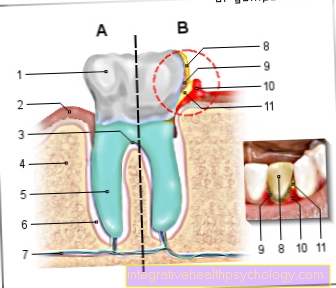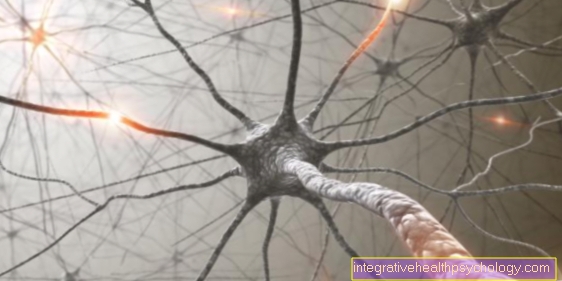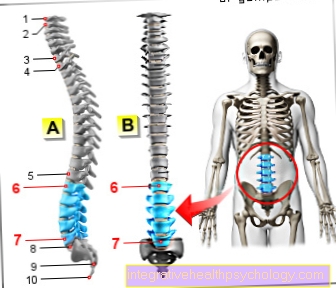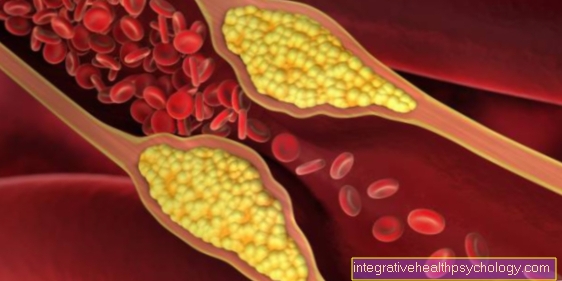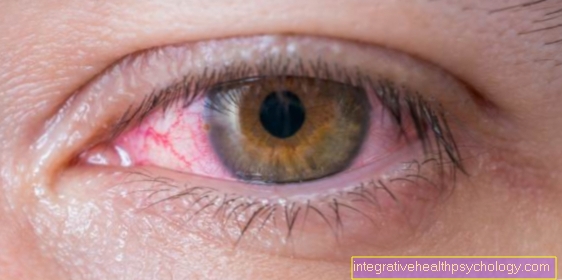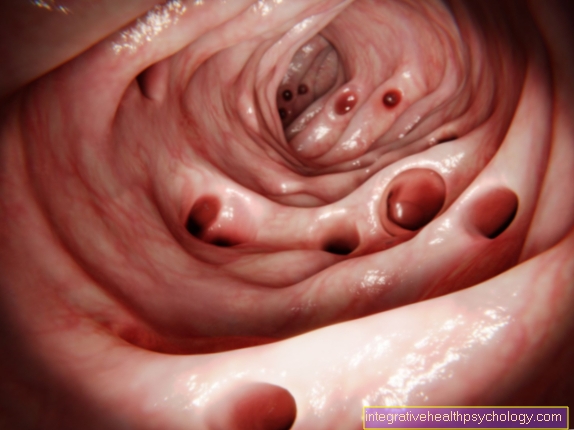Long-term effects after radiation treatment
What are long-term effects after radiation therapy?
Almost every second person treated for cancer also has to undergo radiation therapy. Although this does not cause any symptoms at first, it can lead to negative effects over time, which often only show up as long-term effects.
This means that various consequential damages can only occur weeks, months or even years after the treatment.
The long-term consequences that can occur depends in particular on the type of cancer or the region of the body that was irradiated.
In particular, the skin and mucous membranes are often affected, with the long-term effects of radiation on any organ.
Do you want to understand what happens in the human body during radiation therapy?
- Read our article on this: Effect of radiation therapy

Typical symptoms that indicate long-term effects after radiation
Many patients are surprised that they initially feel only slightly or not at all affected by radiation.
In many cases, the treatment leads to undesirable side effects only after some time, whereby the possible symptoms are not always immediately recognized as a late consequence of the radiation due to the time lag.
For example, there are frequent changes to the skin that is in the radiation field.
In some cases it becomes darker, in some people there is more of a discoloration.
Connective tissue changes in the lungs (fibrosis) are a possible long-term consequence after radiation in the chest area.
If typical findings such as increased shortness of breath occur, for example during exercise, a connection should be considered. Other causes such as primary lung diseases or damage to the heart are also possible.
If the abdominal or pelvic area has been irradiated, adhesions can be the long-term consequence. Typical symptoms, which often only appear after many years, are mostly cramp-like abdominal pain and problems with bowel movements.
In general, however, there are always a multitude of other possible causes of the complaints for all possible symptoms that can indicate a late sequelae after radiation.
In case of doubt, you should consult your family doctor if you are uncertain.
Are you worried about the long-term effects of radiation?
- Find out about the right one here Behavior during radiation therapy
Long-term effects on the skin
The skin is the organ that is most often damaged by radiation. With the exception of the "radiation from the inside" (so-called brachytherapy), which is possible with some cancers, the rays have to penetrate the skin and damage can almost never be completely avoided.
In addition to the skin irritation that often occurs early and which can turn out to be like sunburn, late effects are possible after exposure to the skin.
Discoloration or a dark discoloration of the skin areas in the radiation field are rather harmless and only cosmetically relevant.
Many people also experience prematurely aged skin, which means that it loses its elasticity and is drier. The dilation of tiny blood vessels in the skin (capillaries) can cause spider-shaped red patches of skin known as telangiectasias.
Are you observing pigment changes on your skin?
- Find out about the Pigmentation disorders therapy - how to remove them
Paradoxically, these processes of premature skin aging as a long-term consequence of radiation increase the risk of developing skin cancer. If skin changes appear years after exposure to radiation, they should be demonstrated to the family doctor or, if necessary, a dermatologist (dermatologist) at an early stage to be on the safe side.
With irradiated skin, you should also pay more attention to adequate sun protection throughout your life.
Would you like to know how to recognize skin cancer?
- These are the symptoms of skin cancer
Long-term effects after radiation therapy after breast cancer
Nowadays, when it comes to radiation for breast cancer, you can usually proceed in a very targeted manner and protect nearby organs. In addition to the slight damage to the skin, which can usually not be completely avoided, all organs in the chest can suffer long-term effects. In general, the cells that frequently renew and divide are particularly at risk.
The mucous membrane of the esophagus should be mentioned in particular. Typically there are early consequences that can lead to pain, nausea, and loss of appetite. Long-term effects such as painful changes are also unlikely after radiation treatment for breast cancer, but cannot be ruled out.
The lungs and heart are usually also close to the radiation field. For the reasons mentioned above, the heart in particular is not very susceptible to radiation damage. Nevertheless, long-term effects have been described in individual cases after radiation treatment in breast cancer.
For example, a cardiac arrhythmia caused by small scars in the heart muscle can occur as a late consequence of radiation after breast cancer.
The lungs can develop scarred changes, you can lead to increased shortness of breath and the associated reduced resilience.
Long-term effects after radiation therapy after colon cancer
In the case of colon cancer, radiation usually only takes place if it is rectal cancer. The irradiation is often carried out before the operation.
Long-term effects of radiation after colon cancer therefore predominantly take place in the small pelvis.
A distinction can be made between damage to the intestine itself and late effects on neighboring organs and tissues.
In the intestine, the influence of radiation therapy can, for example, lead to a scarred constriction, which is also known as stenosis, as a long-term consequence.
If this occurs, only a new operation will often help. If there are no alternatives, in some cases an artificial anus has to be created in the case of a stenosis.
Despite this possible long-term consequence, it must be borne in mind that without radiation, the risk of rectal cancer is significantly higher that the malignant tumor will grow again (also called relapse).
Other possible long-term consequences after radiation after colon cancer are adhesions from the outside, which can lead to pain, stool retention and, in the worst case, an intestinal obstruction.
Possible long-term effects after radiation after colon cancer that do not affect the intestine are, in particular, damage to the many fine nerves in the pelvis.
This can lead to urinary incontinence or erectile dysfunction in men.
Long-term effects of radiation after lung cancer
After radiation treatment after or during lung cancer, possible long-term effects most often occur on the lungs themselves. Irradiation can lead to scarred changes that reduce lung function even after months or even years.
The affected people suffer from reduced performance and possibly shortness of breath or coughing.
However, the changes described can also be the result of an operation for lung cancer. If both forms of treatment have been carried out, it is usually not possible to say what is ultimately responsible for the long-term consequences.
It is important that the doctor is consulted if symptoms occur. In rare cases, these may be signs that the lung cancer is recurring.
A second cancer can also occur as a long-term consequence after radiation treatment for one lung cancer.
Long-term consequences after irradiation of the pelvis
Irradiation in the pelvis can cause various long-term effects, as many different organs and sometimes very fine and sensitive conduction pathways run in a confined space.
Adhesions or narrowing can occur in the intestine as a long-term consequence.
In this way, the radiation can be responsible for symptoms such as intestinal cramps and difficulties with bowel movements even after a long time.
If the nerves that control the bladder are damaged, long-term effects can also occur here.
Some people suffer from uncontrolled urination while others have problems urinating.
In men, a long-term consequence after irradiation of the pelvis can also lead to a disorder of potency, so that erection and ejaculation are no longer normal or possibly no longer possible.
A urologist should be consulted if there are any complaints.
If the pelvis is irradiated on younger people, there is also the risk that fertility will be impaired.
In the case of young women in particular, radiation should only be given if it is unavoidable, otherwise in the worst case, infertility can develop as a long-term consequence.
As with any form of irradiation, a second tumor can develop as a long-term consequence after irradiation of the pelvis.
Long-term effects after radiation treatment of the head
Radiation of the head is usually required for cancerous ulcers in the brain or on the skull itself and can lead to various long-term effects. Fortunately, in most cases the hair loss on the scalp, eyelashes and eyebrows that typically occurs immediately after irradiation is not permanent.
In some people, however, the hair growth is clearly thinned as a late effect and the hair is visibly thinner.
A wig can help here, although the costs are usually covered by the health insurance, at least for women.
Are you interested in alternative medical approaches in the treatment of hair loss?
- Find out about Homeopathy for hair loss
Further long-term effects after irradiation on the head can show on the teeth.
In particular in the case of already existing gum problems, these can worsen due to radiation, so that the premature loss of teeth may be a long-term consequence.
Other organs on the head that can suffer from radiation are the salivary glands. Their function can noticeably decrease as a long-term consequence, so that those affected suffer from dry mouth, bad breath and an increased risk of infection in the oral cavity.
Contrary to the fear of many people, long-term effects rarely occur on the most important organ in the head. The brain is comparatively less susceptible to the damaging effects of radiation. This can be explained by the fact that radiation damages tissue in particular, which consists of cells that often divide.
The nerve cells in adults show only little activity in this regard.
In children, however, brain development can be damaged.
Nevertheless, this is often necessary in the presence of a brain tumor and the possible long-term consequences must be taken into account after weighing.
Long-term consequences after irradiation of the bladder
Various late effects are possible after irradiation of the bladder. Most of the time, the bladder emptying function is disturbed. Two different courses are possible.In some people, the long-term consequence is uncontrolled leakage of urine (incontinence).
On the contrary, as a long-term consequence of irradiation, the bladder can no longer be emptied or can only be emptied with difficulty. Men are increasingly affected by this, and the prostate must always be examined for enlargement.
If the bladder cannot or not completely emptied, this often leads to infections of the urinary tract, which also ascend to the kidneys and can thus be dangerous.
As a long-term consequence of irradiation of the bladder, it may ultimately be necessary that a permanent urinary catheter is placed over the abdominal wall and has to be changed regularly.
Do you have concerns about a urinary tract infection?
- Find out more about the topic: How contagious is a urinary tract infection?
Recommendations from the editorial team
- Treatment by radiation therapy
- Effect of radiation therapy
- Behaviors to be observed during radiation therapy


